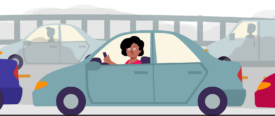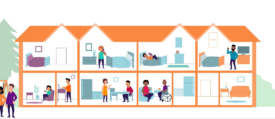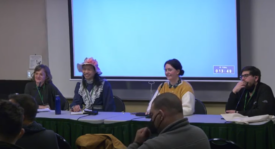We generally think of taxes in terms of “me,” not “us.”
But one thing that Donald Trump has delivered to the US mainstream is an, ahem… unusually lively conversation about taxes—even a rare discussion about why they’re important. We’ve heard everything from the so-called “genius” of high-powered business people using loopholes to avoid taxes to heartfelt declarations that taxes are a patriotic duty to the many ways the system is broken.
Bernie Sanders summed it up (of course, this was before November 8): “I have been running all over this country for a year-and-a-half talking about a corrupt tax system. And in one day, Donald Trump did more to explain the corrupt tax system to the American people than I did in a year-and-a-half. Thank you, Donald.” As John Cassidy put it in the New Yorker, the scandal wasn’t Trump not paying taxes or even not saying how much he paid; “The scandal, instead, is what he was able to do lawfully thanks to the structure of the tax code.”
The good news: Americans see taxes as a way to invest in the country and our communities (at least when prompted). Most folks also understand that things are broken when big fellas get to broker special deals.
And of course, the American tax conversation has been renewed this month with GOP rumblings about overhauling the federal tax code and subsequent questions about Trump’s own tax returns and potential conflicts of interest moving forward. Meanwhile, in Cascadian states like Washington, leaders are deciding the budget, and local taxpayers—and people in at least 140 communities around the country—are gearing up for public demonstrations on Tax Day.
Now is the perfect opportunity to share an excellent messaging resource from our friends at Fuse Washington Communications Hub. Based on extensive interview and survey research in Washington State and building on nationwide research conducted by public interest communications strategy firm Topos, these strategies reflect the real attitudes and voices of Americans.
6 Tips for Talking Taxes
- Start with the common good. We all benefit from taxes—but we need reminders. Focusing only on specific groups (seniors, kids, the poor) can trigger “me” and “them” thinking. Shift to“us” and “we” by starting with shared benefits and “thriving communities.”
- Give concrete examples of the “foundations” of thriving communities. Give examples of the public systems and institutions on which we build our health, prosperity, and quality of life: excellent schools, first responders, clean water, transit, parks, and libraries.
- Highlight big-picture priorities, not process. Taxes and dollars aren’t the end goals. Highlight the community benefits that taxes deliver.
- Play up aspirations, achievements, and local pride—not problems. Talk up achievements and goals, not shortfalls. Stir up local pride in both place and progress. Show that with the money to do it, we can do great things and make people’s lives better.
- Focus on cleaning up our tax code. Loopholes and special deals drain public investments that benefit everybody. Cleaning up unlocks resources, holds those at the top accountable, and shifts blame from government.
- It’s manipulation we don’t like, not wealth. It’s okay to be rich. It’s wrong for powerful special interests to get away with manipulating the tax code to serve themselves.
Here’s an example of how All In Washington combines these powerful messages into a concise narrative. (The text below is paraphrased. Be sure to check out the group’s explainer video for the whole story.)
We take pride in our state. There’s nowhere we’d rather live. We have proven we can do great things. We are at our best when no one is left behind. But our innovative spirit hasn’t come through in our tax code. In fact, Washington’s tax code is the most upside-down in the nation. In other words, we ask the Washingtonians with the least to contribute a far greater share of their incomes—as much as seven times what those at the top pay—while powerful special interests get a special deal. Our tax code doesn’t reflect our values.
Taxes are how we all chip in to build foundations for strong, thriving communities and do things together that we could never do alone, like build great schools, roads, and bridges, or train and pay firefighters and librarians! It’s how we create the infrastructure for an economy that works for all of us and that makes possible a strong middle class. We can unlock the resources our communities need by cleaning up the hundreds of special deals that powerful interests and the wealthy have forced into the tax code.
Tax Day is fast approaching. Let us know how you cut through the IRS sniping and partisan posturing to talk about how we all build thriving communities together!

Original Sightline Institute graphic, available under our free use policy.











Patrick Alesse
I am excited about the concept of shifting tax discussion from “me” to “we” or “me” to “us”. Usually the tax shift is from “he” to “thee”. I would welcome an open discussion on taxes.
Bill Bradburd
As an indication of how the powerful have avoided taxes and shifted the burden to others, Seattle’s developers continue to avoid paying Development Impact Fees allowed to be collected under State law.
The recent Metropolitan Park District property tax levy, the Move Seattle property tax levy, and the shortage of school facilities (putting thousands of Seattle school kids into portables), could have been avoided or minimized had Seattle been collecting these from developers (who anecdotally make 20% or more profit).
But the Seattle City Council and Mayor, who are to a large degree bought by development-friendly donors, continue to avoid using a taxing tool that virtually every other surrounding municipality uses.
Is it fair that your property taxes continue to rise with developers pocketing the excesses of this growth? Sadly Sightline seems tightly aligned with the developers on this issue….